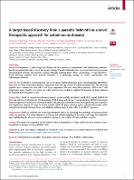| dc.contributor.author | Ni, Yangyue | |
| dc.contributor.author | Xiong, Ruiyan | |
| dc.contributor.author | Zhu, Yuxiao | |
| dc.contributor.author | Luan, Ning | |
| dc.contributor.author | Yu, Chuanxin | |
| dc.contributor.author | Yang, Kun | |
| dc.contributor.author | Wang, Huiquan | |
| dc.contributor.author | Xu, Xuejun | |
| dc.contributor.author | Yang, Yuxuan | |
| dc.contributor.author | Sun, Siyu | |
| dc.contributor.author | Shi, Liyun | |
| dc.contributor.author | Chen, Lin | |
| dc.contributor.author | Chen, Lu | |
| dc.contributor.author | Hou, Min | |
| dc.contributor.author | Xu, Zhipeng | |
| dc.contributor.author | Lai, Ren | |
| dc.contributor.author | Jia, Minjun | |
| dc.date.accessioned | 2024-03-05T22:19:15Z | |
| dc.date.available | 2024-03-05T22:19:15Z | |
| dc.date.issued | 2023-08-12 | |
| dc.identifier.citation | Ni, Y., Xiong, R. Z., Yuxiao... Padde, J. R., ...Jia, M. (2023). A target-based discovery from a parasitic helminth as a novel therapeutic approach for autoimmune diseases. EBioMedicine, 95. https://doi.org/10.1016/j.ebiom.2023.104751 | en_US |
| dc.identifier.uri | http://dir.muni.ac.ug/xmlui/handle/20.500.12260/617 | |
| dc.description.abstract | Background: Regulatory T cells (Tregs) can alleviate the development of autoimmune and inflammatory diseases, thereby proposing their role as a new therapeutic strategy. Parasitic helminths have co-evolved with hosts to generate immunological privilege and immune tolerance through inducing Tregs. Thus, constructing a “Tregs-induction”-based discovery pipeline from parasitic helminth is a promising strategy to control autoimmune and inflammatory diseases.
Methods: The gel filtration chromatography and reverse-phase high-performance liquid chromatography (RP-HPLC) were used to isolate immunomodulatory components from the egg extracts of Schistosoma japonicum. The extracted peptides were evaluated for their effects on Tregs suppressive functions using flow cytometry, ELISA and T cell suppression assay. Finally, we carried out colitis and psoriasis models to evaluate the function of Tregs induced by helminth-derived peptide in vivo.
Findings: Here, based on target-driven discovery strategy, we successfully identified a small 3 kDa peptide (SjDX5-53) from egg extracts of schistosome, which promoted both human and murine Tregs production. SjDX5-53 presented immunosuppressive function by arresting dendritic cells (DCs) at an immature state and augmenting the proportion and suppressive capacity of Tregs. In mouse models, SjDX5-53 protected mice against autoimmune-related colitis and psoriasis through inducing Tregs and inhibiting inflammatory T-helper (Th) 1 and Th17 responses.
Interpretation: SjDX5-53 exhibited the promising therapeutic effects in alleviating the phenotype of immune-related colitis and psoriasis. This study displayed a screening and validation pipeline of the inducer of Tregs from helminth eggs, highlighting the discovery of new biologics inspired by co-evolution of hosts and their parasites.
Funding: This study was supported by the Natural Science Foundation of China (82272368) and Natural Science Foundation of Jiangsu Province (BK20211586). | en_US |
| dc.description.sponsorship | The Natural Science Foundation of China (82272368) and Natural Science Foundation of Jiangsu Province (BK20211586). | en_US |
| dc.language.iso | en | en_US |
| dc.publisher | eBioMedicine | en_US |
| dc.subject | Helminth-derived peptide | en_US |
| dc.subject | Target-driven discovery strategy | en_US |
| dc.subject | Treg | en_US |
| dc.subject | TolDCs | en_US |
| dc.subject | Inflammation | en_US |
| dc.title | A target-based discovery from a parasitic helminth as a novel therapeutic approach for autoimmune diseases. | en_US |
| dc.type | Article | en_US |

